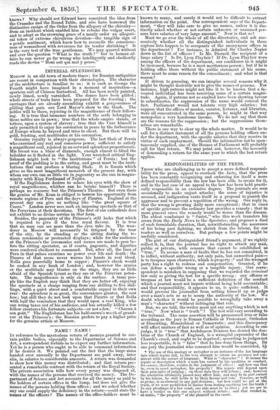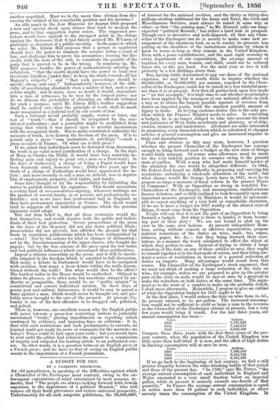RESPONSIBILITIES OF THE PRESS.
THOSE who are challenging us to accept a more defined responsi- bility for the press, appear to overlook the facts, that the press has been constantly recognizing and enforcing for itself a more defined responsibility than the law has been able to create for it, and in the last case of an appeal to the law has been held practi- cally responsible in an excessive degree. The journals are seen occasionally to make unjust attacks ; the sense of injustice is aroused, and indignation vents itself in a proposal to punish the aggressor and to prevent a repetition of the wrong. Our reply is, that the wrong is growing daily more exceptional ; that in cases of specific grievance the ordinary law provides a remedy ; that in more general cases the remedy would be worse than the disease. The ablest combatant is " Jurist," who this week transfers his arena from the Daily News to the Spectator, and proposes a duel of such formidable duration, that, notwithstanding the assurance of his being past fighting, we shrink from the labour, for our readers as well as ourselves. But perhaps a few points might be usefully considered. The gist of our distinguished friend's argument, if we rightly collect it, is, that the journal has no right to attack any man, public or private, with censure that cannot be established as "true." To accuse a man of faults that he has not committed, is to inflict, without authority, not only pain, but unmerited pain— is to trespass upon character, which is property ;* and the wronged party has a right to redress and compensation. Granted, if he can define a specific wrong or a tangible injury. Our corre- spondent is mistaken in supposing that we regarded the criminal law only as giving the test for a specific wrong : any offence or trespass at law would be a sufficient definition of the conduct which a journal must not impute without being held accountable ; and that responsibility, it appears to us, is Suite sufficient. It would prevent the journalist from setting himself up as judge over a man's acts so as to usurp the authority of the law. We doubt whether it would be possible to wrongfully take away a man's " character " without infringing that rule. But, we are told, the writer must not say anything which is not " true." Now what is " truth " ? The test will vary according to the tribunal. The same assertion will be pronounced true or false according as the jury is Roman Catholic or Protestant, Orthodox or Dissenting, Monarchical or Democratic ; and this discrepancy will affect matters of fact as well as of opinion. According to one judge, it is " true " that Archdeacon Denison has denied the doc- trine of the Church of England, is a wrongful expounder of the Church's creed, and ought to be deprived ; according to judges not less respectable, it is " false " that he has done those things. By one jury the journalist who censured him would be convicted, by • The use of this analogy or metaphor is an instance of the lax language into which legists fall, in the very attempt to attain an accuracy not con- sistent with the nature of language. What is "character " ? It means the repute or description which a man has earned by his qualities or conduct. Its essence, therefore, resides in the judgment of others : and how can that be, even in exact metaphor, his property ? His repute will depend upon their principles of judging ; on those data they will debate ; and,.pe however the resolution ultimately passed may affect him, and may be in part earned by his labour, he still holds it by their favour and vote. Censure, as well as praise, is an element in any just decision ; but how could we get at the truth, if we were prohibited in amine from stating anything but the truth ? In any pleadings of a law court, one side must be in error ;• yet we are to have a verdict on this one subject without debate ; and that verdict * sb initio, "the property" of the plaintiff in the cause.
another acquitted. Must we in the mean time abstain from dis- cussing the subject of his remarkable position and his doctrine ?
An able paper in the Law Magazine for August 1855 proposed a new and special check upon abuses that tend to weaken the press, and to that suggestion Jurist refers. The suggested pro-
cedure would have applied to the strongest point in the charge
against the Scotsman, that it had falsely accused Mr. M‘Laren of partiality as chairman of a public meeting. In the paper to which we refer, Mr. Edwin Hill proposes that a person so aggrieved
should have the power to summon the accuser before a court of law, and challenge him to prove his accusation; leaving the dis- credit, with the costs of the suit, to constitute the penalty of the party that is proved to be in the wrong. In summing up, Mr. Ilill proposes, besides the power of authoritatively uttering the refutation, " that the courts should have the power to bind over inveterate falsifiers [under fine] to keep the truth towards all her Majesty's subjects' ; and " that such proceedings should be speedy, cheap, and easy." Independently, however, of the diffi- culty of ascertaining absolutely even a matter of fact, such a pro- cedure might, and in many cases no doubt it would, degenerate into a race of witnesses, to be won by the longest purse : nor do we discern the probability of obtaining an efficient tribunal
for such a purpose, until Mr. Edwin Hill's further suggestion shall be carried out—that the principle of truth shall be much more recognized as a judicial teat by our courts of law.
Such a tribunal would probably supply, sooner or later, one test of " truth "—that it should be recognized by the con- stituted authorities ; and a journalist might be prohibited frum saying that which it was agreed upon to account inconsistent with the recognized truth. But to make constituted authority the measure of truth, is to destroy the freedom of the press. It is to permit only a press " cum auctoritate et privilegio "—such a press as exists in France. Of what use is that press ? If we admit that individuals must be defended from discussion, the truth is no valid moral justification of a charge. In the days of Mary or Charles the Ninth, it would have been wantonly in- flicting pain and injury to point out a man as a Protestant; in the days of Sacheverel, a charge of being a Papist would have
been wantonly cruel, however true ; thirty-five years ago the truth of a charge of Radicalism would have aggravated the in- ]iziy ; and more recently to call a man an Atheist, was to deprive h• of employment, property, civil rights, and family.
Some have thought to fix the responsibility by forbidding the writer to publish without his signature. This would necessitate
a certain kind of accommodation-signing, wherever writings are
the product of several hands, or of persons not professionally os- tensible ; and as we have had professional bail in England, so they have professional signatories in France. The check would tend to suppress all but individual opinions which the genuine sinatary could adopt. But our firm belief is, that all these restraints would de- feat themselves, and would deprive both the public and indivi- duals of their best protection. Severe prosecutions of the press in the days of the Regency did not put down political libels ; prosecutions did not prevent, but afforded the ground for that trade in scurrilous publications which has been extinguished by —what? Not by the actions for libel or charges of defamation ; not by the discountenancing of the upper classes, who bought the papers ; but by the free censure of the press upon the low tastes and bad political influences which encouraged those publications. Impose a stricter censorship on the press, and it will be inevit- ably crippled in the freedom which is essential to full discussion. How many a debate in Parliament would have to be castigated with excision, how many a keen debate within the walls discon-
tinued without the walls l But what would then be the effect ? The hardest railer in the House would be unchecked. Obliged to
mince its phrases, or to utter none but assertions stamped by au- thority as permissible, there would be no " public opinion" to countervail and correct individual opinion. In these days of
penny post and railway intercourse, it would be easy to spread a fama against a man, which would never be brought out, and pro- bably never brought to the ears of the accused. At present, Ca- lumny is one of the first offenders to be dragged out, pilloried, and pelted.
There is, however, one excellent reason why the English public will never tolerate a press-law restricting writers to judicially ascertained "truth," placing impediments on reporting unless confirmed by evidence, and imposing fines on criticism : it is, that with such restrictions and such preliminaries to execute, no journal could get ready its news or comments for the morrow—no
today's Times could be laid upon your table ; but you would have to wait until the editor had referred the reports to a commission of inquiry and subjected his leading article to an authorized cen- sor. In other words, it is a question between an English press or a French press ; and we have no fear of seeing an English public assent to the importation of a French journalism.



































 Previous page
Previous page